The ‘2Bin1Bag’ initiative of Bengaluru has helped avoid 180 tonnes of waste going to landfills
About 2 lakh households have pledged to take up the responsibility to segregate their waste, thanks to the ‘2Bin1Bag’ initiative
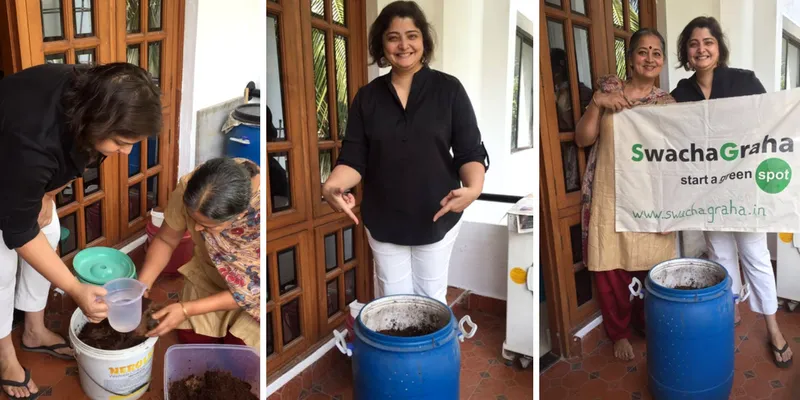
Long before Prime Minister Narendra Modi announced the Swachh Bharat campaign, a group of women were gravely concerned about the gross mismanagement of waste in the city. They began to wonder what could be the solution to the menacing problem of waste.
The mismanagement in the city had manifested itself in the form of rotting waste in empty plots, toxic landfills, littered streets, burning piles of garbage, and various forms of pollution.
To the women of the Bellandur area of Bengaluru, the solution lay is segregating the waste and treating it. This is the story of these women who are championing the cause of waste management and spreading the idea throughout the city and slowly inspiring other urban agglomerations as well.
Where should your waste go?
During the Mandur crisis of 2013, the women of the Bellandur area of Bengaluru grew increasingly concerned about the waste disposal in the city. The Bruhat Bengaluru Mahanagara Palike (BBMP), the civic body in Bengaluru, was dumping nearly 1,800 tonnes of waste per day in a landfill in Mandur, a village just about 25 kilometres away from Bengaluru. The result? Accumulation of bio-methane, posing a threat of catching fire, soil, water and air pollution.
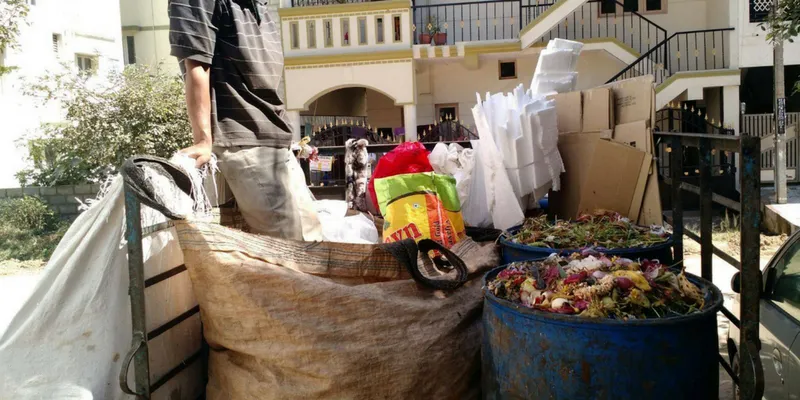
The crisis demanded a solution, one that is sustainable and environmentally sound. The women of the Bellandur area decided that the solution lied in waste segregation, and treating the waste collectively. And the concept of ‘2Bin1Bag’ was born.
In order to ensure uniformity and to do away with any confusion over segregation, the women came up with a simplified, colour-coded concept that the entire city can implement by simply following a few steps. The idea is to have one bin for all your wet waste, all the kitchen and garden waste in the green bin. And the unsavoury waste such as sanitary waste, bio-medical waste and construction debris can go into the red bin. The bag is for all the recyclable waste such as plastic, paper, glass, metal and other dry waste.
“Initially, people were full of excuses and there was a lot of confusion as to what goes where. So we decided that we need a thumb rule or a standard model to get segregation done in a uniform manner,” says Lalita Mondreti, one of the women who formulated the concept.
The women initially implemented the segregation at their apartment buildings, and gradually started approaching other buildings in the neighbourhood. The group of women started spreading awareness about how segregation done for an entire building would be more beneficial and easier for the housekeeping staff to handle as well.
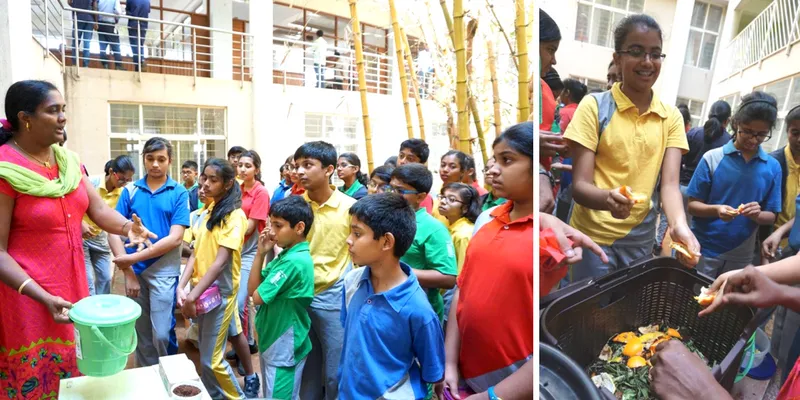
Although the women started the concept in the Bellandur area, they reached out to about 25,000 people within a few months. Looking at the success, a couple of women from the group joined SWMRT (Solid Waste Management Round Table) in 2014, a platform of various organisations, individuals and vendors all working in the field of waste management who exchange ideas, share experiences and come out with a common agenda for Bengaluru’s solid waste management.
Swachagraha
People often don’t understand what’s happening to waste once it leaves their house. Because of a lack of awareness, there is a lack of responsibility towards one’s environment, waste and also towards the ragpickers of the society.
Lalitha’s initial motivation towards waste management began when she was moved by the sight of ragpickers salvaging waste from empty plots filled with garbage. That’s when she decided not to send out her waste. She began to compost her waste and also started telling friends and neighbours about it.
Soon people began to realise that although the waste is being segregated, it wasn’t always picked up on time. Many didn’t know what to do about it. In 2015, Lalitha and other members of the SWMRT came up with the campaign Swachagraha for composting waste, which stand for ‘clean planet’. The campaign encourages people to start a green spot within their homes, by composting, growing and cooking.
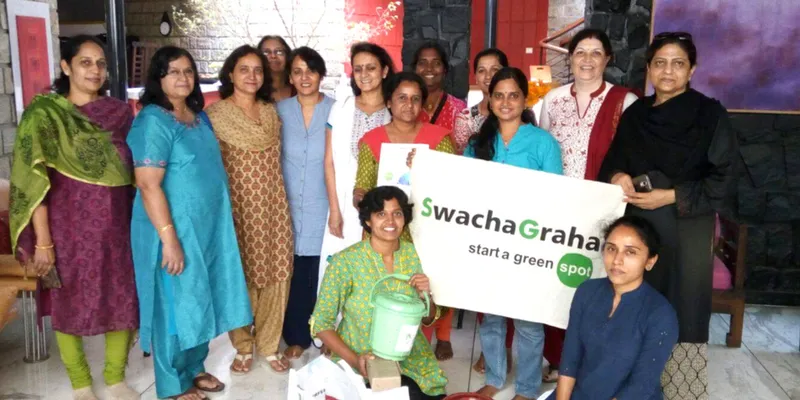
The wet waste can be composted at home and used as manure to grow vegetables within the confines of one’s house. The vision of Swachagraha is to start a million greenspots in Bengaluru. The team is currently working with BBMP to have composting santé in different wards of the city, where composting vendors and solution providers and the locals have a platform to interact within their vicinity.
In these santés, people are encouraged to take up the Swachagraha Challenge, with the task of composting a week’s wet waste from their households. Owing to this challenge, nearly, 50,000 residents of Bengaluru have taken to composting.
Impact
“The relentless efforts of pioneers such as Ramakant and Almitra Patel motivated us greatly to do our bit to help our city. Across Bengaluru city, there are several such motley groups that have been inspired similarly and are working to transform their neighbourhoods," says Lalitha.
"This is an effort to bring all such citizen initiatives under the same umbrella so that we can share our learnings and thereby build on our strengths, while creating a cohesive movement working for a clean city,” she adds.
A citizen-level movement is now transformed into a policy-level change. In 2014, BBMP issued guidelines for segregation of waste for households and other bulk waste generators and a penalty for violators.
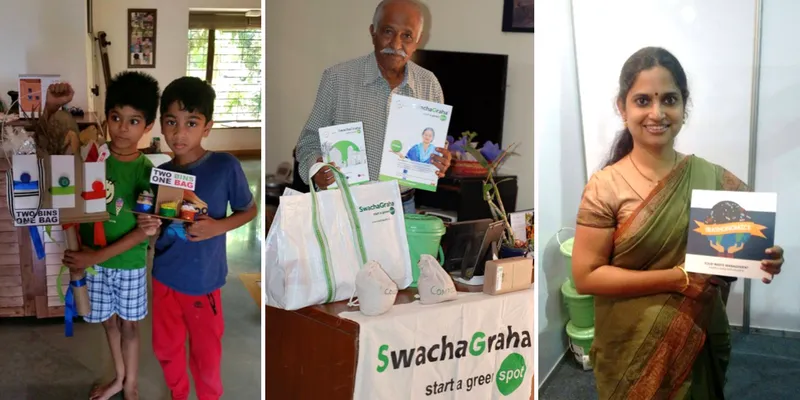
The last four, years, the initiative has seen volunteers from different neighbourhoods of Bengaluru conducting door-to-door campaigns.
Thanks to the concept of 2Bin1Bag, BBMP has reported that nearly 80-90 percent of the waste annually is being segregated. Inspired by the success of these campaigns, residents from 15 cities across India have reached out to the 2Bin1Bag team to implement the concept within their localities.
The Swachagraha team has, so far, helped BBMP organise 22 composting santés in the city of Bengaluru, and plans to organise many more in the near future.







